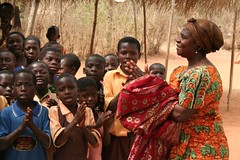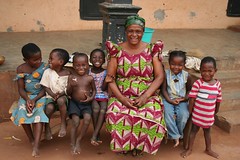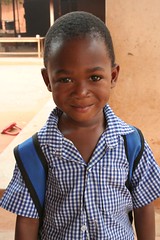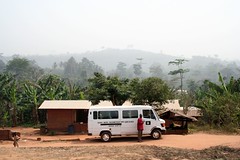
EJISU, Ghana–We're in the most famous and historic of West African towns, literally one village over from the geographic centre of the world – the Ashanti pride and joy, where the famous divine stool of the most famous of African tribes still rests in the palace of the Asantehene.
And for the past two days, a group of African Canadians have been pinching themselves.
They've met, sat and talked, touched and ate bread with the great-granddaughter of the legendary Ashanti female warrior Nana Yaa Asantewaa, who, at 70, rallied her people to hold off the British imperialists at the turn of the 20th century.
Yensomu, the Toronto group that is here to connect with Mother Africa and the people of Ghana, from the capital to Ejisu and smaller villages four hours north, will return home this weekend weighted down with drums, kente cloth from the famous weaving town, artifacts and souvenirs from their three-week pilgrimage.
But it's what they left in Ghana that will form the greatest legacy as their remarkable odyssey ends here Saturday.
They've left: Computers in a country school that has revitalized an entire rural community; money to help district "Queen Mothers" take care of AIDS orphans; support for the Virgin Club, a unique anti-AIDS program that sees local teenage girls pledge to avoid sex before marriage; and a borehole that will bring clean water to an elementary school of 250.
"Many people come to visit us and leave," the chief, Nana Yaw Acheampong, told Yensomu's leader, Kwasi Kafele, yesterday as the noonday sun beat down on the children, resplendent in their uniforms. "But you have left something with us."
For Yensomu, it's been a five-year love affair with the people of Ghana, usually the ones in small villages like Abankuro, near Ejisu, one of the districts in the Ashanti Region.
And the villagers have loved them in return.
"This is building us up," said headmistress Grace Nyantakyi. "It encourages us and motivates the kids. You should have seen them working on their English so they can speak to the Canadians."
Kafele, who's been coming to Africa for more than a decade, has taken great pains to stress that his group seeks real partnership with African communities, not top-down, "we know best" project development.
"We are here, brothers and sisters, to help you, work with you, support you, learn from you, build with you and grow with you," he said, as elders, chiefs, politicians, community leaders and the school population listened.
"We come with open hearts, open minds, a love for Africa and a love for the children of Abankuro."
Kevin Hood, of Markham, presented the community with about $700 he collected from friends in Toronto to dig a well, or a borehole as it's known here. He read off the 33 names of the donors. Then the group did a ceremonial groundbreaking for the project that will bring clean drinking water to the school and the immediate community.
Another Yensomu project started four years ago gave the school the distinction of being the only one in the district with computers. Partnering with Bishop Strachan School in Toronto, Yensomu brought 15 computers to the school earlier and is donating four more – just in time, as only five were up and running yesterday. Lab instructor Bob John Ayensu blames frequent power surges and blackouts, plus lack of knowledge about how to fix the aging computers.
The computers have created many spinoff benefits. Students who used to travel to other schools are now staying in the district. Student teachers are lining up to practise-teach at Abankuro, so they can get the computer experience. A middle school class has also been added.
The brick block walls for what is supposed to become a permanent computer lab are partially up – though the tall grass growing through and around the bricks suggest the project is stalled.
With all the activity, retailers are selling more goods, and Abankuro residents are the envy of their neighbours.
Yensomu has provided money for books for Ejisu's only library, which serves more than 20 schools and thousands of children. The locals have agreed to plant a garden there and rename the library after Nana Yaa Asantewaa.
Yensomu is also showing its love for the town's storied history by initiating the creation of a life-size sculpture of Nana. It was supposed to grace the library, but organizers here now plan to give the statue a more prominent place, in the major roundabout being constructed in the town square.
Legend has it that, a century ago, the Ashanti chiefs had a secret meeting in Kumasi, plotting how to bring back the king of Assante (Ashanti), whom the British had captured and exiled.
Sensing the men were afraid, Nana rallied the village women.
"If the men of Ashanti will not go forward, then we will. We, the women, will," she said.
She then organized a boycott by the women, who denied conjugal rights to the chiefs until the men found their backs stiffened for battle. The chiefs made Nana their war general and the Ashanti kept the British at bay for three years.
On Monday, Nana's great-granddaughter, also Nana Yaa Asantewaa, 39, was at her regal best, dancing to greet the Torontonians.
As one of the Queen Mothers who preside over the region's 36 districts, Nana has a vision for the young, especially young women.
She and other Queen Mothers have started a Virgin Club for young girls, who pledge chastity before marriage as a hedge against contracting HIV.
The Queen Mothers lead them through the rites of passage, teaching the roles and responsibilities of Ashanti womanhood.
Among the 115 girls who have joined is Alizatu Abena, 17, who lives with Nana.
"At first she didn't like it because some of the girls made fun of her, but now she's proud," Nana tells the Star. "We teach them how to dress, do their hair, look attractive, take care of themselves. You don't have to look plain because you are a virgin."
Asked about her dreams for her community, Nana replies: "To have enough money to do what everybody wants. To take care of the kids and the teens. Everybody comes to me with their problems. It's tough sometimes."
And there are other projects supported by Yensomu.
In Manya Krobo, east of Ghana's capital, Accra, Yensomu members lived for four days with the locals, eating, sleeping and soaking up African culture. They pledged to support 35 kids with HIV with medicine, food and clothing for a year. The Queen Mothers of Manya Krobo have taken in more than 1,000 such kids and integrated them into their own families.
"The Manya Krobo project is probably the most pressing because the spectre of death is so present and the urgency is so sharply defined," explains Kafele.
Those wishing to support Yensomu's efforts can go to the group's website, yensomu.org, or call 905-948-1035 when the group returns next week.
Royson James is in Ghana as part of a journey through West Africa and England marking the 200th anniversary of the abolition of the slave trade throughout the British Empire.



